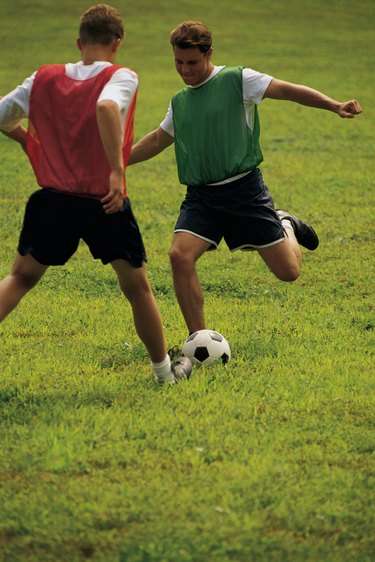
Before a soccer game, you need to consume a large quantity of carbohydrates, a moderate amount of protein and a low amount of fat. This includes breakfast on game day. Without adequate, balanced nutrition, you won't have enough energy to play your best. If you're having difficulty developing a diet plan that aids your soccer performance, ask a dietitian or sports nutritionist for advice.
Make it High in Carbs
Video of the Day
Three to four hours before a game, soccer players should have a breakfast based primarily on carbohydrates, such as 1 cup of oatmeal paired with low-fat milk, a glass of orange juice, a banana and a piece of whole-wheat toast. Complex carbohydrates -- such as whole grains -- will ensure that your muscles have enough glycogen to get you through the game. Glycogen is the storage form of glucose and is the compound your cells use for energy. If only a few hours remain before game time, focus on low- or nonfat dairy or carbohydrates that are low in fiber and are easily digestible, such as fruit. These choices provide quick energy and are less likely to give you an upset stomach. A fruit smoothie prepared from yogurt, milk and fresh fruit is also a good option.
Video of the Day
Go Lean on Your Protein
Breakfast before a soccer game should contain low-fat protein. High-fat meats, such as sausage or bacon and whole milk dairy products, can slow your digestion and give you an uncomfortable, heavy feeling. Instead, pair your fruit with plain, low- or nonfat yogurt, have a hard-boiled egg or vegetable omelet or spread whole-grain toast with unsweetened nut butter to meet your protein needs. A typical moderate-protein breakfast for a soccer player might be a scrambled egg, whole-grain pancakes and 1 cup of low-fat milk, which would supply approximately 18 grams of protein. As you get closer to game time, choose a liquid form of protein to reduce digestion time, such as a high-carb fruit smoothie prepared with milk and yogurt.
Keep Pre-Game Fat to a Minimum
Skip butter, margarine and any breakfast entrees featuring gravy, cream sauces or oil-heavy items such as chicken-fried steak or fried potatoes. Your pre-game meal should consist of no more than 5 percent fat if you're eating three to four hours before play. If you are eating closer to game time, your meal should contain less than 5 percent fat. In a typical breakfast, the fat should come from foods naturally high in mono- and polyunsaturated fats such as canola or olive oil, nuts, seeds or avocados. For example, put one-half of a sliced avocado on your omelet or mix 1 ounce of toasted nuts or seeds into your oatmeal.
Fill Up on Fluid
Drink at least 2 to 3 cups of water with breakfast three or more hours before a game and continue to drink more as the start time nears. Drink milk, smoothies, sports drinks, and plain or diluted 100-percent fruit or vegetable juice to contribute to your morning fluid intake. Avoid sugary or carbonated beverages and heavily caffeinated products such as commercial energy drinks.